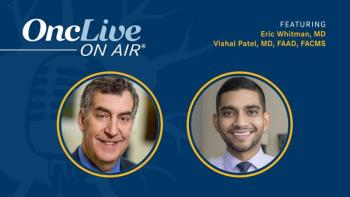
Thymic Cancer Experts Discuss the Latest Data, Need for More Research Funding

Drs Giaccone and He discuss the implications of their thymic cancer research, the importance of combining immunotherapy and anti-angiogenesis agents to treat solid tumors, and the challenges of investigating rare cancers.
Welcome to OncLive On Air®! I’m your host today, Jason Harris.
OncLive On Air® is a podcast from OncLive®, which provides oncology professionals with the resources and information they need to provide the best patient care. In both digital and print formats, OncLive® covers every angle of oncology practice, from new technology to treatment advances to important regulatory decisions.
In today’s episode, we spoke with Giuseppe Giaccone, MD, PhD, and Yongfeng He, PhD, with Weill Cornell Medicine in New York City, New York, about thymic cancers for our Rare Cancers series. Dr Giaconne is a professor of medicine and associate director of clinical research at the Sandra and Edward Meyer Cancer Center. Dr He is an instructor of cancer biology in medicine.
Primary thymic epithelial tumors are a heterogeneous collection of malignancies that differ in both appearance and biological behavior. The thymus is a gland in the anterior superior mediastinum near the heart where the immune cells are formed. The disease affects approximately 400 to 600 Americans annually, but incidence is not clear because thymic cancers can be difficult to diagnose.
Angiogenesis inhibitors have shown some efficacy in treating thymic cancers, and chemotherapy and radiation are options for advanced disease, but there is no FDA-approved treatment for this malignancy.
Drs Giaccone and He have developed genetically engineered mice to harbor the GTF2I L424H mutation, the most common mutation found in thymic epithelial tumor cells. This single-point mutation can induce thymic tumors, and they hope that this discovery will enable physicians to treat the disease by targeting the genes regulated by this mutation.
In this exclusive conversation, the doctors discuss the implications of their research, the importance of combining immunotherapy and anti-angiogenesis agents to treat solid tumors, and the challenges of investigating rare cancers.
___
That’s all we have for today! Thanks again to my guests, Drs Giuseppe Giaccone and Yongfeng He, and thank you for listening to this episode of OncLive On Air®. Check back on Mondays and Thursdays for exclusive interviews with leading experts in the oncology field.
For more updates in oncology, be sure to visit www.OncLive.com and sign up for our e-newsletters.
OncLive® is also on social media. On Twitter, follow us at @OncLive and @OncLiveSOSS. On Facebook, like us at OncLive and OncLive State of the Science Summit and follow our OncLive page on LinkedIn.
If you liked today’s episode of OncLive On Air®, please consider subscribing to our podcast on Apple Podcasts, Spotify, Google Podcasts, Amazon Music, and many of your other favorite podcast platforms,* so you get a notification every time a new episode is posted. While you are there, please take a moment to rate us!
Thanks again for listening to OncLive On Air®.
*OncLive On Air® is available on: Apple Podcasts, Google Podcasts, Spotify, Amazon Music, Audacy, CastBox, Deezer, iHeart, JioSaavn, Listen Notes, Player FM, Podcast Addict, Podchaser, RadioPublic, and TuneIn.






































